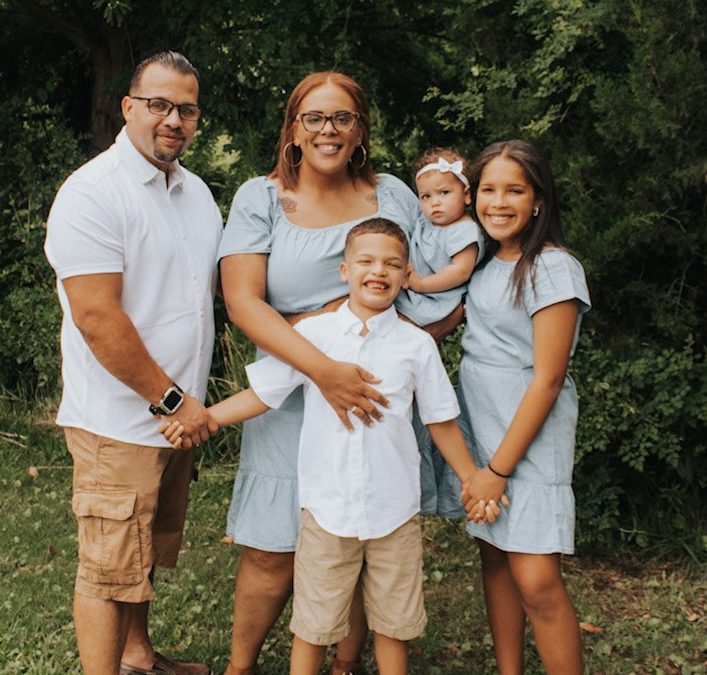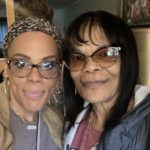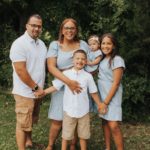Once a Victim, Now an Advocate

Noemi with husband Franky, and their children Scarlet, Franky Jr., and Hazel.
For more than 30 years, she kept the secret.
Now she is ready to tell anyone who wants to listen.
As a child, Noemi Rivera grew up in a household where domestic violence was the norm.
“My earliest memories are of witnessing my father physically hurt my mother,” she said. “What started off good went really bad.”
Her father would not allow her mother to work and controlled the household finances. He dictated the way her mother dressed, who she communicated with, and how she cared for the couple’s three children. Rivera’s father was also abusive to her two brothers, something Rivera did not fully understand until she was an adult.
“That was life, that was my childhood – total control at the hands of my father,” she said. “But he never laid a hand on me. I was the princess.”
Rivera recalls a particular day in third grade when she had hope that things might change. She did not want to leave for school that morning for fear that her father would hurt her mother after she left. Upon arriving at school, she pretended to be sick in an effort to be sent home. The guidance counselor could tell something was amiss and asked what was wrong. Rivera blurted out “I’m scared my father is going to hurt my mother!” The guidance counselor asked a few questions but Rivera kept her responses vague and made the adult promise not to tell anyone.
“This was the deep dark family secret,” Rivera said.
Later that day when she returned home from school Rivera was relieved to see her mother. The relief quickly turned to panic when her father said they needed to return to school.
“I was terrified. We walked to the school, just me and my dad, and we get to the school and it was an award ceremony,” she said. “I never felt so disappointed in my life. I wanted something to happen. I thought I would be relieved but it was an award ceremony. I never talked about it again.”
The abuse continued until Rivera was about 10-years-old when one day her father left for the store and never returned. Despite the abuse she had suffered, Rivera’s mother begged and pleaded for her husband’s return. Rivera stepped in to help her mother (a native Spanish speaker) translate job applications and try to find work to support the family.
“I told her we didn’t want him to come back. We didn’t need him,” she said. “I finally felt the relief of not having to worry about anyone getting hurt.”
Rivera’s father made several attempts to return to the family through the years and when he showed up to the house with bags, prepared to move back in when she was about 13, Rivera had had enough.
“I told him no. You need to leave and go,” she said. “The little girl he never hurt was screaming at him to leave.”
Studies show that children who experience domestic violence in the home are at a greater risk for repeating the cycle as adults by entering into abusive relationships or becoming abusers themselves. Unfortunately, that was the case for Rivera whose first relationship in college was one of domestic violence. Her boyfriend of three years was controlling and physically abusive, and yet, she stayed.
“Of course I didn’t tell anyone anything,” she said. “I was strong enough to kick out my father but wasn’t strong enough to break up with this man.”
Her boyfriend eventually ended the relationship but Rivera was left with physical and emotional scars.
Earlier this year, at the age of 33, Rivera made the courageous decision to share her story in front of a room full of hundreds of women during a business conference, describing the experience as “freeing.”
“So many women came up to me and said ‘I was a victim too.’ It was really incredible,” she said. “I felt not sharing this made me almost feel like a fraud for years. I felt that I would be disqualified as a professional and as a social worker.”
However, it has been quite the opposite.
“Because of my past I have been able to be successful in my journey and my career because I can wholeheartedly say that I know what someone is going through,” she said. “I can empathize. I know what it’s like to be a victim. I know what it’s like not to be heard. I know the courage it takes to disclose and tell someone.”
Rivera, a former Child Protective Services caseworker, and now the director of the One Place Child Advocacy Center, has used her past to fuel her drive and determination to serve child victims.
“I decided to dedicate my life to protecting children from people like my father. This is why I am in this field,” she said. “Do I wish the child in me had to experience that? No. But there’s hope and what is in front of you is not what is going to happen for the rest of your life.”
Her takeaway from it all? Be the one. Be the supportive adult a child needs in their life. Be the one who listens and takes action.
“Listen to a child, it is our responsibility as adults to believe them,” she said. “If a child says something to you, you must do something. You cannot fail that child.”
In 45-60% of homes where domestic violence is present, child abuse is also occurring. As part of her work with the CAC, Rivera has provided training to staff at the Onslow Women’s Center about the co-occurrence of child abuse in domestic violence situations.
Happily married now with two children of her own, Rivera hopes to continue to be a supportive and caring adult to all children with whom she crosses paths and a listening ear for survivors of abuse.
“I want someone to know out there that they aren’t alone in this. They are not weak. You can get through this. We are in this together. There’s hope,” Rivera said. “That’s what people need. That’s what I needed. It’s what my mom needed. There’s hope.”
Domestic violence, like child abuse, thrives in silence, but if we take a stand and work together, we can end it. For domestic violence assistance in Onslow County call the Onslow Victim’s Center 24-hour crisis line at or visit https://www.onslowvc.org/
Click here for more information on the One Place Child Advocacy Center.
Click here to support child abuse prevention and intervention through One Place.



